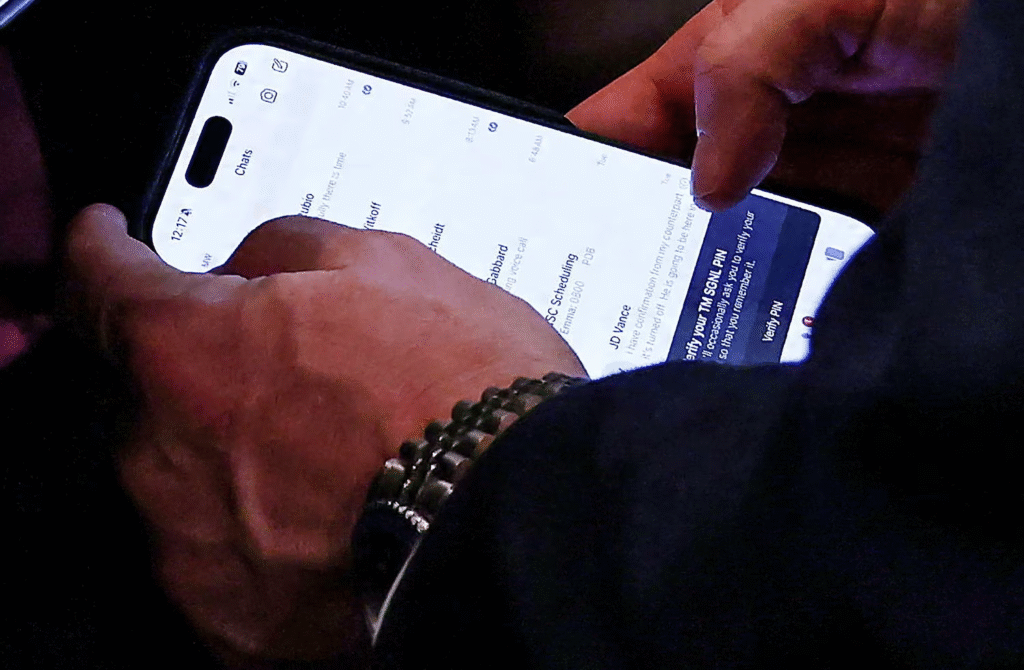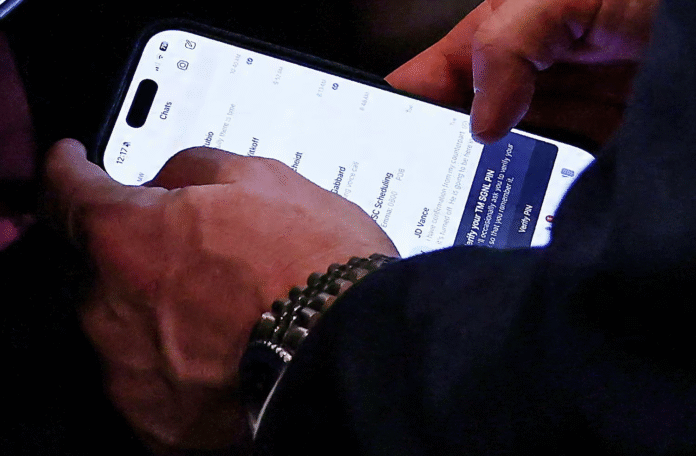
In a sudden but not entirely unexpected shake-up, President Donald Trump has removed Mike Waltz from his role as National Security Adviser, following a growing controversy over his use of the encrypted messaging app Signal during official business—including a sensitive discussion about a U.S. military strike in Yemen. While the White House is publicly downplaying the matter, behind closed doors it appears the scandal had eroded confidence in Waltz’s ability to manage the nation’s most guarded intelligence and diplomatic strategies.
The final straw may have come on April 30, when Waltz was photographed during a Cabinet meeting openly using Signal on his government-issued phone. The image captured by a Reuters photographer showed Waltz mid-message, with his screen displaying names such as Vice President JD Vance, Secretary of State Marco Rubio, Director of National Intelligence Tulsi Gabbard, and Middle East envoy Steve Witkoff—key figures in Trump’s foreign policy circle. The timing of the photograph couldn’t have been more damning: within 24 hours, Trump had replaced Waltz and reassigned him as the nominee for U.S. Ambassador to the United Nations.
The Signal Debacle
The scandal first erupted in March when Waltz inadvertently added journalist Jeffrey Goldberg of The Atlantic to a Signal group chat discussing plans for a U.S. military strike on Houthi militants in Yemen. The group included several top administration officials, such as Defense Secretary Pete Hegseth and VP Vance. Though Waltz insisted that no classified material was exchanged and that he was unsure how Goldberg ended up in the chat, the slip-up sparked alarm across Washington.
For weeks, Trump stood by his adviser, brushing off Democratic demands for an investigation and defending Waltz’s actions as “an honest mistake.” Yet, sources within the administration have revealed that the president’s patience began to wear thin as the controversy dragged on and media scrutiny intensified.
Despite claims by the White House that Signal is an approved communication tool for government-issued devices, the app’s use in official channels—particularly for matters of national security—remains a point of contention. In fact, the Pentagon previously discouraged its employees from using Signal for official business due to concerns over records retention, compliance with classification protocols, and the potential for unauthorized disclosures.
A Broader Investigation Unfolds
The Department of Defense’s acting Inspector General, Steven Stebbins, recently confirmed that an investigation is underway into how the app has been used by top defense officials. The probe, initially focused on Hegseth’s conduct, has reportedly expanded to include a separate Signal chat in which Hegseth shared the timing of the Yemen strike with personal contacts—including his wife, brother, and lawyer.
“This evaluation will examine compliance with Department of Defense policies on communications, classification standards, and records retention,” Stebbins said in a statement, underscoring the gravity of the situation.
The findings could have implications well beyond Waltz, potentially affecting a broader range of officials and deepening the controversy surrounding how the Trump administration conducts national security operations.
Political Fallout and Congressional Gridlock
The fallout from the Signal incident has highlighted ongoing partisan divides in Washington. While Democratic lawmakers have called for full transparency and oversight, Republican leadership in Congress has blocked efforts to launch a formal investigation into the Yemen chat scandal, citing insufficient evidence of wrongdoing and concerns about politicizing national security issues.
Critics argue that such obstructionism only reinforces the perception of impunity within the executive branch and raises troubling questions about accountability and transparency at the highest levels of government.
Rubio Steps In—For Now
In the wake of Waltz’s departure, President Trump tapped Secretary of State Marco Rubio to assume the national security adviser role on an interim basis, a move that surprised some but was viewed by others as a pragmatic solution. Rubio will retain his current duties at the State Department while stepping in to stabilize the National Security Council amid the ongoing controversy.
Rubio brings experience and political clout to the table, but the dual role will test his ability to balance competing priorities—especially with multiple foreign policy crises simmering around the globe, from the Middle East to the Pacific Rim.
A Soft Landing for Waltz?
Despite his removal, Waltz appears to have avoided a complete fall from grace. Trump’s announcement that he would nominate the former Green Beret-turned-politician to serve as U.S. Ambassador to the United Nations suggests that the president still values Waltz’s loyalty and wants to keep him within the administration’s inner orbit.
However, confirmation for the ambassadorship may not be smooth sailing. Given the lingering questions surrounding his conduct and the potential findings from the Inspector General’s investigation, Senate Democrats are likely to raise strong objections during the confirmation process.
A Wake-Up Call for Digital Security in Government
The Waltz episode is yet another cautionary tale about the intersection of technology and government. Apps like Signal, valued for their encryption and privacy, may be useful in personal settings—but their role in official federal communications remains controversial, especially when national security is at stake.
The federal government has long struggled to balance the efficiency of modern messaging platforms with the legal and ethical obligations of record-keeping and information security. This latest incident may force a reevaluation of how such tools are used—and misused—by those in positions of power.
As the administration scrambles to contain the fallout, the Signal scandal underscores a broader theme of the Trump presidency: the tension between technological agility and institutional discipline, and the fine line between innovation and recklessness.
Waltz may have left his post, but the questions his tenure raised are only beginning to demand answers.


